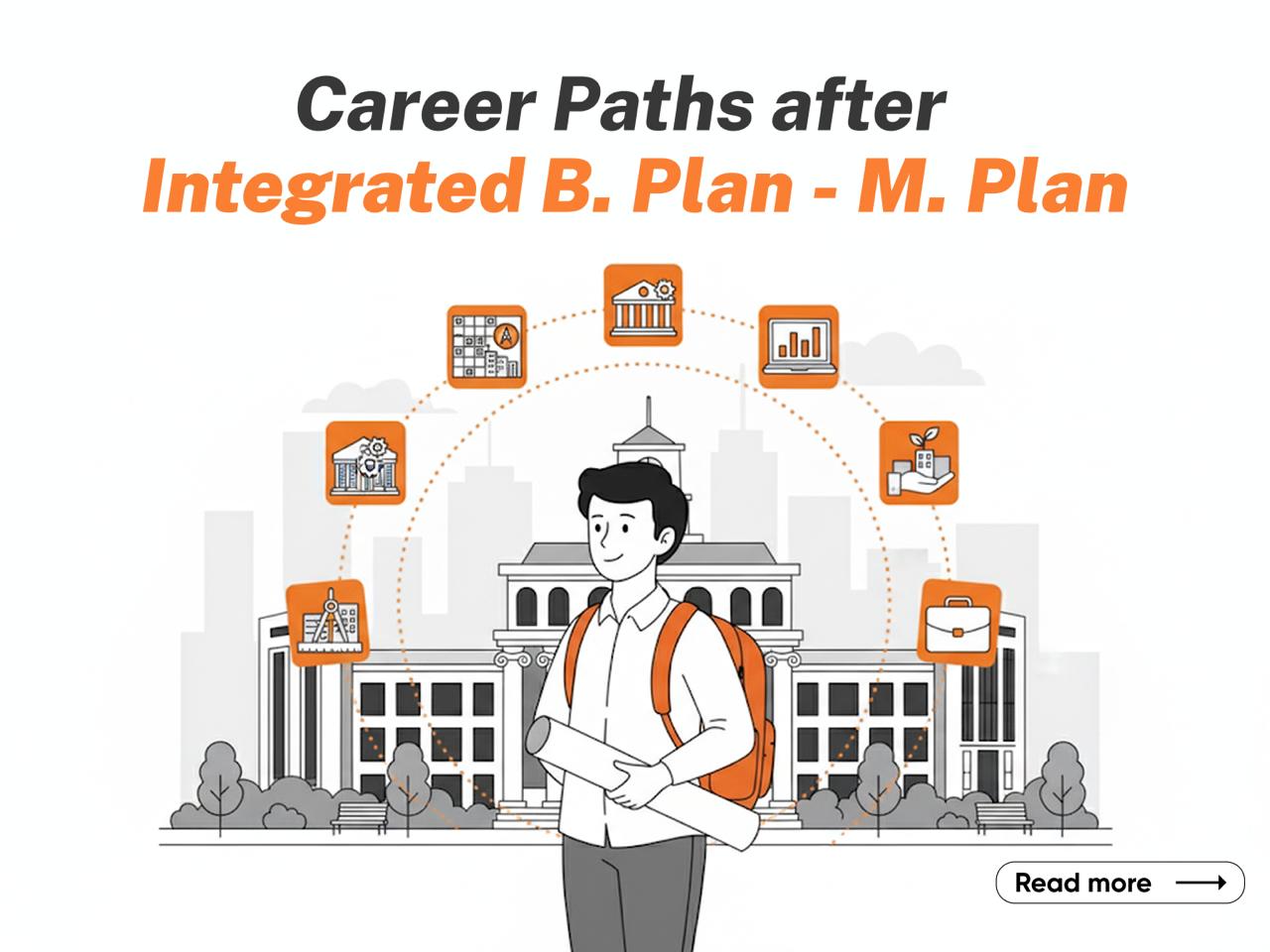- What Is the Scope of Integrated B. Plan – M. Plan in Today’s Industry?
- Why Integrated B. Plan – M. Plan Is a Smart Career Choice Today?
- Key Domains and Advanced Topics in Integrated B. Plan – M. Plan
- Key Skills to Succeed in Integrated B. Plan – M. Plan
- Emerging Trends in Urban and Regional Planning
- Career Options After Integrated B. Plan – M. Plan
- Scope and Salary Trends for Integrated B. Plan – M. Plan Graduates
- Top Recruiters That Hire Integrated B. Plan – M. Plan Students
- What After Graduation? Higher Studies & Certifications
- Final Thoughts
- FAQs
What Is the Scope of Integrated B. Plan – M. Plan in Today’s Industry?
The scope of Integrated B. Plan – M. Plan in today’s rapidly urbanizing world is both vast and dynamic. By the year 2050, nearly 70% of the global population will be living in urban areas, creating immense challenges related to housing, sustainable infrastructure, transportation, environmental conservation, and governance. Cities will need to be designed not just as places to live, but as smart, resilient, and sustainable ecosystems. This growing demand opens up tremendous urban planning career opportunities for individuals who can combine technical expertise, innovative design thinking, policy analysis, and community-centric solutions.
The Integrated B. Plan – M. Plan programme at Lovely Professional University (LPU) plays a pivotal role in preparing such professionals. Unlike the traditional approach where students first pursue a Bachelor of Planning (B.Plan) followed by a Master of Planning (M.Plan)—which takes nearly six years—this integrated planning course allows students to graduate in just five years. This makes it a time-efficient and future-oriented programme that builds both a strong foundation in planning principles and advanced expertise in specialized domains of planning.
The integrated planning course scope at LPU covers a broad spectrum—ranging from urban planning and regional development to transportation systems, housing strategies, GIS applications, and smart city innovations. Graduates of this programme step into the industry with a unique dual advantage: they are academically qualified with both undergraduate and postgraduate-level expertise and practically trained to handle real-world planning challenges.
| Did You Know? According to reports, India alone requires more than 3,00,000 trained urban planners by 2030 to successfully implement its ambitious programmes such as the Smart Cities Mission, AMRUT, and Housing for All. This ensures that the scope of Integrated B. Plan – M. Plan graduates remains strong both in India and globally. |
Why Integrated B. Plan – M. Plan Is a Smart Career Choice Today?
When students think about shaping the future of cities and communities, they often wonder: why choose Integrated B. Plan – M. Plan over a traditional single degree? The response is rooted in the unique benefits of integrated planning. The Integrated B. Plan – M. Plan programme at Lovely Professional University (LPU) is not only academically rewarding but also professionally strategic, offering students a head starts in the highly competitive field of urban and regional planning careers.
Key Benefits of Integrated Planning
- Preserves Important Time: Instead of taking six years to accomplish a separate B.Plan and M.Plan, students can graduate in a mere five years. This efficiency permits them to enter the job market earlier, holding both undergraduate and postgraduate credentials.
- Comprehensive Interdisciplinary Learning: The programme blends knowledge from architecture, economics, sociology, environmental studies, governance, and technology, preparing graduates to handle planning challenges from multiple perspectives.
- Higher Employability: With advanced skills and dual expertise, students are better prepared for the urban planning career opportunities available in government bodies, infrastructure companies, consultancy firms, and international agencies.
- Global Relevance: The curriculum is aligned with international planning practices, giving students a competitive edge not just in India but also in global markets like the Middle East, Europe, and North America.
- Contribution to Nation-Building: Graduates play a vital role in Smart Cities projects, AMRUT (Atal Mission for Rejuvenation and Urban Transformation), Housing for All initiatives, metro rail expansions, and sustainable infrastructure development—areas where the scope of Integrated B. Plan – M. Plan graduates is steadily expanding.
| Did You Know? India’s Smart Cities Mission alone is expected to create thousands of job openings for trained planners in the coming decade, making the integrated planning course scope more promising than ever. |
Key Domains and Advanced Topics in Integrated B. Plan – M. Plan
The Integrated B. Plan – M. Plan syllabus at Lovely Professional University (LPU) is carefully structured to ensure that students develop a strong foundation in planning principles while progressively advancing into specialized areas of urban and regional development. What makes the programme truly distinctive is its balance between theoretical frameworks, practical studio work, and cutting-edge technological training.
The programme emphasizes domains in planning and design that align with current industry needs and future urban challenges. Each domain introduces advanced topics in planning, enabling students to gain expertise in both conceptual thinking and practical applications.
Domains and Advanced Topics Covered in Integrated B. Plan – M. Plan Syllabus
| Domain | Advanced Topics in Planning |
| Urban Planning | Land Use Planning, Smart Cities and Digital Infrastructure, Urban Renewal and Redevelopment Strategies |
| Regional Planning | Rural-Urban Integration, Regional Development Models, Sustainable Resource Allocation |
| Transport Planning | Metro Systems and Mass Rapid Transit, Sustainable Mobility Solutions, Transit-Oriented Development (TOD) |
| Environmental Planning | Climate-Resilient Cities, Green Infrastructure Planning, Solid Waste & Water Resource Management |
| Housing & Real Estate | Affordable Housing Models, Public-Private Partnerships (PPP) in Housing, Housing Policy Frameworks |
| GIS & Remote Sensing | Spatial Data Analysis, Geoinformatics for Planning, Digital Mapping and Smart Visualization Tools |
How These Domains Shape Student Expertise
- Urban Planning prepares students to design smarter, more inclusive cities by focusing on land-use distribution, smart technology integration, and urban renewal strategies.
- Regional Planning equips them to analyze the interconnections between urban and rural areas, ensuring balanced development at the regional scale.
- Transport Planning offers insights into mass rapid transit systems, sustainable urban mobility, and the growing importance of TOD models in modern cities.
- Environmental Planning addresses global concerns like climate change, green infrastructure, and ecological sustainability, helping students build expertise in resilient planning.
- Housing & Real Estate develops knowledge about affordable housing frameworks, policy reforms, and the role of PPP models in tackling urban housing crises.
- GIS & Remote Sensing empowers students with technological skills in spatial data visualization, mapping, and geoinformatics, which are vital for smart city planning and decision-making.
| Did You Know? The use of GIS and digital mapping is now a core requirement for most urban planning career opportunities, and students trained in these technologies are in high demand globally. |
Key Skills to Succeed in Integrated B. Plan – M. Plan
To thrive in the field of planning, students must develop a balanced mix of technical expertise, creative problem-solving, and managerial competencies. The Integrated B. Plan – M. Plan programme at LPU focuses on building these essential planning skills to ensure graduates are ready for the dynamic demands of the industry.
Core Skills for Success
- Analytical & Research Skills
Strong analytical skills in planning help students assess urban problems, interpret data, and design evidence-based solutions for cities and regions. - Design Thinking & Visualization
Creative urban design skills enable planners to conceptualize livable, aesthetic, and sustainable spaces through innovative visualization techniques. - GIS & CAD Software Proficiency
Mastery in GIS and planning skills with tools like ArcGIS, AutoCAD, and Revit allows students to create spatial maps, analyze geodata, and design smart city models. - Policy Analysis & Interpretation
Planners must understand and evaluate government policies, zoning laws, and housing frameworks to align their projects with real-world regulations. - Communication & Negotiation Skills
Effective communication ensures that planners can negotiate with stakeholders, present designs, and engage communities for successful project execution. - Leadership & Project Management
Strong leadership skills help graduates coordinate multi-disciplinary teams and manage complex urban planning projects from start to finish.
| Did You Know? LPU’s advanced planning labs are equipped with modern GIS and CAD software, enabling students to work on live urban projects right from their first semester. |
Emerging Trends in Urban and Regional Planning
The landscape of planning is evolving rapidly. Driven by technology, sustainability goals, and global urbanization, planners today must stay ahead of the curve by adapting to future trends in planning. The Integrated B. Plan – M. Plan programme at LPU trains students to navigate these significant shifts in the planning of smart cities and sustainable urban environments.
Key Emerging Trends
- Smart Cities & IoT Integration
The rise of smart cities planning relies on IoT-enabled infrastructure, digital sensors, and real-time data analysis for energy, traffic, and waste management systems. - Green Urbanism and Climate-Resilient Design
Sustainable urban planning emphasizes eco-friendly materials, renewable energy, and climate-resilient designs that safeguard cities against floods, heatwaves, and rising pollution levels. - Digital Twins & AI in Planning
Advanced technologies like AI and GIS in planning allow the creation of digital twins—virtual replicas of cities that simulate urban growth, transport flow, and disaster management strategies. - Transit-Oriented Development (TOD)
Future trends in planning emphasize compact, walkable neighbourhoods around metro and transit hubs, reducing dependency on private vehicles and encouraging sustainable mobility. - Affordable Housing Models
Innovative housing policies and PPP models are being developed to tackle urban housing crises, making inclusive and affordable living a central priority. - Sustainable Waste & Water Management
Planners are focusing on circular economy models, waste segregation, and advanced water recycling systems to ensure resource-efficient cities.
| Did You Know? According to UN-Habitat, over 70% of global cities are already integrating GIS in planning to improve resource allocation, mobility, and disaster preparedness. |
Career Options After Integrated B. Plan – M. Plan
An Integrated B. Plan – M. Plan degree opens up diverse and rewarding career opportunities in both the public and private sectors, where professionals are in high demand for shaping sustainable, livable, and future-ready cities. Graduates have the opportunity to seek the following positions after completing their B.Plan or M.Plan:
- Urban Planner Careers: Work with city development authorities, real estate firms, or municipal corporations to design master plans, housing projects, and smart infrastructure.
- Regional Planning Jobs: Focus on balanced development across districts and states by working with government bodies, planning commissions, or international agencies.
- Transportation Planner: Design and manage efficient urban mobility systems, metro networks, highways, and transit-oriented projects to reduce congestion and improve accessibility.
- Environmental Planner: Contribute to climate-resilient development by integrating sustainable design principles, environmental regulations, and eco-friendly solutions in projects.
- Smart City Consultant: Join smart city missions and consultancy firms, applying IoT, GIS, and data-driven planning for sustainable urban growth.
- GIS Specialist: Specialize in Geographic Information Systems (GIS) for mapping, spatial data analysis, and urban design, supporting planning authorities and private consultancies.
- Policy Analyst: Work with think tanks, research organizations, or government agencies to draft urban and regional policies that guide future development.
- Academician / Researcher: Contribute to academics or research in urban studies, design innovation, and sustainable planning while teaching at universities or engaging in global research projects.
With the growing emphasis on smart cities, sustainable infrastructure, and urban transformation, professionals with an Integrated B. Plan – M. Plan can build impactful careers in design, consultancy, policy, and research domains.
Scope and Salary Trends for Integrated B. Plan – M. Plan
The scope of planners in India and abroad is expanding rapidly with increasing demand for sustainable cities, smart infrastructure, and regional development. Graduates with an Integrated B. Plan – M. Plan degree can expect attractive career growth and competitive packages across multiple roles. Below are the urban planning salary trends and opportunities in India and globally:
| Career Role | Average B.Plan M.Plan Salary in India | Global Salary Range |
| Urban Planner | ₹4.5 – 8 LPA | $55,000 – $85,000 |
| Transport Planner | ₹5 – 9 LPA | $60,000 – $90,000 |
| Environmental Planner | ₹5 – 7 LPA | $58,000 – $88,000 |
| GIS Specialist | ₹4 – 6 LPA | $50,000 – $80,000 |
| Smart City Consultant | ₹6 – 12 LPA | $70,000 – $100,000 |
| Did You Know? At Lovely Professional University (LPU), the highest package for planning graduates has crossed ₹12 LPA, with placements in leading infrastructure, real estate, and consultancy firms. |
These salary figures highlight the scope of planners in India as well as lucrative opportunities abroad. With rising investments in urban development, transportation, and smart city projects, the Integrated B. Plan – M. Plan salary package is expected to see a steady upward trend in the coming years.
Top Recruiters That Hire Integrated B. Plan – M. Plan Students
Graduates of the Integrated B. Plan – M. Plan programme are highly sought after by leading planning recruiters, architecture and planning companies, and global organizations working in the fields of urban development, infrastructure, and smart cities. The following are some of the top firms and agencies that actively hire urban planners and planning professionals:
- AECOM – A worldwide leader in infrastructure design and consultancy, providing opportunities in urban planning, transportation planning, and environmental projects.
- L&T Infrastructure – Among India’s leading infrastructure companies, recruiting planners for large-scale projects, smart city initiatives, and urban mobility solutions.
- Shapoorji Pallonji – A distinguished construction and real estate firm, hiring planners for extensive housing and township planning projects.
- JLL (Jones Lang LaSalle) – A prominent real estate and investment management company with positions in strategic urban planning, real estate consultancy, and development planning.
- TATA Realty – A significant entity in the Indian real estate market, offering career opportunities in sustainable urban development, smart city planning, and regional projects.
- CP Kukreja Architects – One of India’s premier architecture and planning firms, presenting opportunities in urban design, landscape planning, and master planning projects.
- Government Development Authorities – City and regional development bodies such as the Delhi Development Authority (DDA), Town & Country Planning Departments, and Smart City Missions frequently recruit planning graduates.
- International NGOs and Agencies (UN-Habitat, World Bank, ADB) – Esteemed global organizations that involve planners in policy-making, sustainable development projects, and international urban initiatives.
What After Graduation? Higher Studies & Certifications
Completing an Integrated B. Plan – M. Plan not only equips graduates with professional expertise but also opens doors to a wide range of postgraduate opportunities and advanced learning pathways. Students who wish to specialize further or build global careers can explore the following:
- Ph.D. in Planning or Urban Studies – For those inclined toward research and academia, pursuing a doctoral degree in planning, urban design, or regional studies offers opportunities to contribute to scholarly work, policy development, and teaching at reputed universities worldwide.
- Global Master’s Programmes – Graduates can opt for international postgraduate opportunities such as specialized master’s in Transportation Planning, Environmental Planning, Housing & Community Development, or Smart Cities from leading universities across the US, UK, Canada, and Europe. These programmes increase international exposure and relevance in the industry. These programmes increase international exposure and relevance in the industry.
- Specialized Planning Certifications – Short-term certifications help graduates upskill and stay competitive in emerging fields. Popular planning certifications include:
- Geographic Information Systems(GIS) & Remote Sensing – For professions in spatial mapping and urban analysis.
- Climate Resilience & Disaster Management – To work on sustainability, resilience planning, and risk mitigation.
- Smart Infrastructure & Sustainable Urban Design – To align with the growing demand for smart city projects and green urbanism.
By pursuing higher studies after Integrated B. Plan – M. Plan or opting for industry-recognized certifications, graduates can carve out niche expertise, gain international recognition, and strengthen their career prospects in academia, consultancy, and global organizations.
Final Thoughts
The Integrated B. Plan – M. Plan at Lovely Professional University is much more than an academic qualification—it is a career-defining journey that empowers students to become leaders in the fields of urban planning, regional development, and sustainable design.
With the growing demand for smart cities, sustainable infrastructure, and climate-resilient urban solutions, the future in planning holds immense opportunities for professionals who can balance creativity with technical expertise. Choosing this integrated programme ensures that students graduate with industry-ready skills, global exposure, and strong career prospects in both public and private sectors.
Conclusion on Planning Career: For students passionate about creating meaningful change in how cities and communities are designed, managed, and sustained, the Integrated B. Plan – M. Plan programme is a gateway to impactful careers in urban planning, consultancy, research, and policy-making.
Why Choose Integrated B. Plan – M. Plan? Because it equips you with the vision, tools, and expertise to shape the future of cities and transform societies through innovative and inclusive planning.
FAQs
- What Are the Key Domains?
The programme covers diverse domains of planning, including Urban Planning, Regional Planning, Transport Planning, Environmental Planning, Housing & Community Development, and Geographic Information Systems (GIS). This ensures holistic exposure to both technical and design aspects of planning.
- What Skills Do I Need?
Students benefit most from the course if they have strong analytical thinking, GIS expertise, design creativity, leadership abilities, problem-solving skills, and a vision for sustainable development.
- What Are the Emerging Trends?
Planning is rapidly evolving with global innovations. Key trends include Smart Cities, Artificial Intelligence in Planning, Green Urbanism, Digital Twins, Climate-Resilient Infrastructure, and Transit-Oriented Development (TOD).
- What Careers Can I Pursue?
Graduates can explore multiple roles such as Urban Planner, Transport Planner, Regional Development Specialist, Policy Analyst, GIS Specialist, Environmental Planner, and Smart City Consultant across both public and private sectors.
- Can I Pursue Higher Studies After This Course?
Yes. Graduates can pursue a Ph.D. in Planning, Urban Studies, or Architecture, or enroll in global master’s programmes specializing in transportation, environmental planning, housing, or smart cities. Certifications in GIS, climate resilience, and sustainable design are also valuable.



![Career Paths after B.Sc. Information Technology [Lateral Entry] Career Paths after B.Sc. Information Technology](https://www.lpu.in/blog/wp-content/uploads/2025/12/Career-Paths-after-B.Sc_.-Information-Technology-218x150.jpeg)






![Is B.Tech. Biomedical Engineering [Lateral Entry] the Right Course for You? Is B.Tech. Biomedical Engineering [Lateral Entry] the Right Course for You](https://www.lpu.in/blog/wp-content/uploads/2025/11/Is-B.Tech_.-Biomedical-Engineering-Lateral-Entry-the-Right-Course-for-You-100x70.png)



